Final report for SSC16-001
Project Information
The overall objectives of the 2016-2017 SARE Program in South Carolina will be to continue the existing strategic planning process for statewide sustainable agriculture
development, to provide professional development opportunities for Extension agents, NRCS field staff and other agriculture professionals and reward outstanding service, and to continue to organize and conduct in-service training in sustainable agriculture practices. The MSP Assistant will work with the state SARE coordinators and advisory committee to organize training activities for 1890 and 1862 Extension and other agriculture professionals that will address critical needs identified by program stakeholders. The program advisory committee met in December 2015 to identify priority topics for the 2016-2017 training program that include: ecologically-based pest management, cover cropping for no-till vegetable production, post-harvest produce handling, land access, high tunnel vegetable production, and tools and implements for small farms. The training will focus on an experiential approach to learning where classroom sessions are supplemented with hands-on training in the field. South Carolina State University 1890 Extension will continue to play a key role in planning and will conduct comprehensive training on sustainable vegetable production with a focus on small-scale and minority owned farms. As in previous years the MSP position will facilitate program reporting and evaluation, and will assist with project accounting and budgeting. A joint budget for Clemson and South Carolina State University has been developed. Funds will be administered through Clemson; South Carolina State University will submit invoices for training expenses directly to the Clemson Sustainable Agriculture Program
- Continue the existing strategic planning process for statewide sustainable agriculture development. Building on new and existing collaborations with stakeholder groups, the state co-coordinators will work with the MSP Assistant and with the SC SARE Advisory Committee to broaden the pool of stakeholders who contribute to the planning process and to the development of educational programs. As in previous years, an annual sustainable agriculture retreat will be organized to identify priorities and to plan educational programs based on stakeholder needs. We will continue to collaborate on training programs with stakeholder organizations and with SARE PDP personnel from neighboring states when appropriate. The comprehensive and inclusive planning process will limit duplication of effort and will help to leverage available resources.
- Continue to provide professional development opportunities for Extension agents, NRCS, FSA and state Department of Agriculture staff and other sustainable agriculture educators. The outcomes of this objective are that these professionals will enhance their knowledge and competency in sustainable agriculture, they will increase their contact with the sustainable agriculture community, and they will be recognized as local experts to be called upon for information on sustainable agriculture. One major opportunity for professional development is the annual Carolina Farm Stewardship Association (CFSA) Sustainable Agriculture Conference, the premier sustainable agriculture event in the Carolinas. The 3-day Conference will be held in Durham, NC in 2016 and will offer workshops on various topics related to sustainable agriculture, many with hands-on demonstrations. Farm tours
are offered in conjunction with the Conference. The CFSA Conference represents a valuable educational opportunity for our agents and other agriculture professionals. It also facilitates interactions between agriculture professionals and farmers. - Continue to support the “Outstanding Sustainable Agriculture Extension Agent of the Year” award to recognize SC cooperative extension personnel for excellence in sustainable agriculture outreach. A call for nominations will be released in summer of each year. The award recipient will receive a travel scholarship to attend a sustainable agriculture event and a plaque recognizing their service to the sustainable agriculture community. The award will continue to encourage the development of innovative public outreach programs by our Extension agents.
- The SC SARE PDP Program will continue to organize and conduct in-service training opportunities for Extension agents, NRCS, FSA and state Department of Agriculture personnel, agricultural educators, and for other interested persons as space permits. Workshop topics will be determined annually by the Advisory Committee (see listing of 2016 workshop topics below). The MSP Assistant, in consultation with the coordinators and the SC CFSA representative, will have overall responsibility for workshop organization, publicity and evaluation.
Advisors
- (Researcher)
- (Researcher)
Education
To the extent possible we have emphasized an interdisciplinary, experiential, and participatory approach to training. For each training practical classroom sessions were supplemented with hands-on training in the field; for example tours of farm demonstration plots, demonstrations of equipment, in-field calculations, and pest scouting and decision making. Primary audiences for the training were 1862 and 1890 Extension agents, NRCS conservation field staff, farmers, and other agriculture professionals who serve small-scale, minority and limited resource farmers as well as those serving larger-scale conventional farms. Strong stakeholder participation and input into educational program development reinforced trainee participation and enthusiasm for the program. Participants in the educational programs increased competency and skills in areas related to sustainable agriculture. Participants gained the knowledge and confidence (i.e. competency) which enabled them to respond positively and knowledgeably to client inquiries regarding principles and practices of sustainable agriculture (based on survey feedback of the training events). Participation also facilitated integration into the sustainable agriculture community during networking sessions so participants are better able to refer clients to additional people/resources. We have also observed that participation in educational programs and interaction with other participants increases the trainee’s level of enthusiasm such that they become increasingly strong advocates for sustainable agriculture.
Education & Outreach Initiatives
Provide training on issues surrounding land access, estate and transition planning, and conservation easements based on stakeholder priorities.
Clemson Sustainable Agriculture Program partnered with a local land conservation and advocacy organization, Upstate Forever (https://upstateforever.org/), to provide 4 workshops in the region in March of 2016 titled "Your Land, Your Legacy". Each three-hour workshop for landowners and their professional advisors focused on protecting land with conservation agreements. Each training event was held at a different location to facilitate participation from around the region.
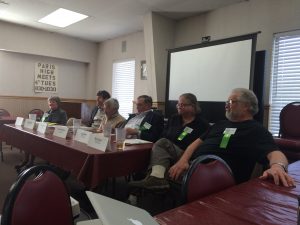
- 4 training events in the subject area around the region.
- March 1, 9am-12pm, Spartanburg, SC (39 participants)
- March 1, 3pm-6pm, Greenville, SC (52 participants)
- March 3, 9am-12pm, Seneca, SC (41 participants)
- March 3, 3pm-6pm, Waterloo, SC (26 participants)
- Multi-organization support and cooperation maximized promotion and attendance of training events.
- Participants gained increased understanding about protecting farm land from future development using Conservation Agreements, and were guided through the application process and benefits of the program.
Organize an event to increase awareness of the critical role that sustainable agriculture can play in mitigating risks from climate change, and of the latest science on climate risk, resilience and climate change adaptation related to agricultural production.
Climate change and agriculture are inextricably involved. Fundamental to our identity as a species, crucial to the health and well-being of our communities, the way that we eat fuels the 21st century challenges that threaten our way of life. A special event was organized on Clemson campus featuring renown author, scientist, educator and farmer, Dr. Laura Lengnick. Dr. Lengnick gave an overview of the latest science regarding the risks of changing climates to agricultural production, and examples of how sustainable agriculture practices can mitigate negative effects of extreme climate changes in climate. Laura's book 'Resisilient Agriculture; Cultivating Food Systems For a Changing Climate' were available to purchase and signing at this event.
About Dr. Lengnick
Laura Lengnick is an award-winning soil scientist who has explored agricultural sustainability for more than 30 years as a researcher, policy-maker, educator, and farmer. Her work in sustainable farming systems was nationally-recognized with a USDA Secretary’s Honor Award and she contributed to the 3rd National Climate Assessment as a lead author of the USDA report Climate Change and U.S. Agriculture: Effects and Adaptation. Laura led the academic program in sustainable agriculture at Warren Wilson College for more than a decade, where she also served as the Director of Sustainability Education, conducted research in sustainability assessment and holistic management, led energy descent action planning, and developed an adaptive sustainable dining policy for the college. In 2015, Laura left the college to launch Cultivating Resilience, LLC, a private consulting firm offering ecosystem-based climate risk management services to government, business, and communities. She serves as an advisor to the USDA Climate Science Learning Network, NC Adapt, and the North American Climate Smart Agriculture Alliance. Laura holds an adjunct faculty position in Horticulture at North Carolina State University. Her new book, Resilient Agriculture: Cultivating Food Systems for a Changing Climate (New Society Publishers), examines climate change, resilience and the future of food through the adaptation stories of 25 award-winning sustainable producers located across the U.S. You can learn more about Laura and her work at www.cultivatingresilience.com
Poster for Laura Lengnick lecture
Flyer for Laura Lengnick Public lecture
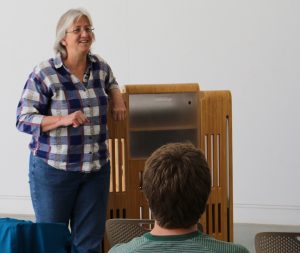
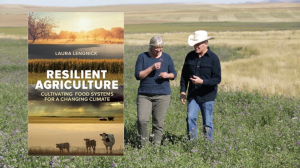
- 4 Educational events were held on Clemson campus and were attended by farmers (including those in the New and Beginning Farmer Program), agriculture professionals, students, faculty and staff:
- Climate Change Within the Context of Agriculture and Food Systems Public Lecture - Wednesday, March 2, Lee Hall at 12:20pm, Clemson University
- One on One meetings with Clemson students and faculty - March 2, E143 Poole Building, Clemson University
- Special Seminar and Book Signing: Climate Risk, Resilience and the Future of Food - November 29th, 6:30pm, Clemson University Strom Thurmond Institute – Self Auditorium
- Class Lecture: HORT4000 Sustainable Agriculture and Local Food Systems - Wednesday Nov. 30, Poole Building Clemson University
- Participants gained an increased ability to think critically about ways climate change is impacting farming and food systems in the United States.
- Participants increased awareness about farming practices that have been proven to reduce risks from extreme weather.
To build the capacity of farmers to meet the burgeoning demand for locally/regionally grown fruits and vegetables by adopting best practices in food safety, post-harvest handling, packing, and business management to be more efficient and profitable.
Small and mid-acreage family farmers are the backbone of a local, responsible food system. Wholesale Success is a comprehensive program developed by the FamilyFarmed organization to help small and mid-acreage fruit and vegetable farmers with one of the biggest challenges they face: growing their businesses! This program gives farmers the resources and tools they need to ensure their produce is of the highest quality, to manage food safety and other risks, and to foster the relationships with customers needed to be successful. The Clemson University Sustainable Agriculture Program and Family Farmed in collaboration with the USDA collaborated to provide two comprehensive training events in Charleston and Clemson.
Each full day training event was taught by Atina Diffley, farm consultant and author, and included food safety best practices, information on working with wholesale buyers, post-harvest handling techniques and best approaches to maintaining the cold chain. There was also discussion of crop specific tools with expert recommendations for harvesting, washing, cooling and storing fruits and vegetables with on-farm demonstrations at each of the two training locations.
Each training participant received the 355 page 'Wholesale Success Manual' which includes the latest best practices information on food safety, post-harvest handling, packing, business management, marketing, and crop-specific profiles for over 100 crops.
About the instructor Atina Diffley:
Atina Diffley is an, author/editor and lead trainer for the FamilyFarmed training program 'Wholesale Success: A Farmers Guide to Selling, Postharvest Handling and Packing Produce'. She is an organic farmer and author of the 2012 award winning memoir, 'Turn Here Sweetcorn, Organic Farming Works'. Atina’s areas of expertise include post-harvest handling, brand-name marketing, greenhouse management, and organic farming systems. She presently serves on the boards of the Organic Seed Alliance and the Minnesota Institute of Sustainable Agriculture.
Wholesale Success workshop announcement
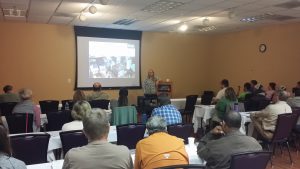
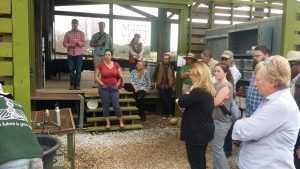
- Two, full-day training workshops were held:
- Wednesday March 9th 2016, Clemson Coastal Research & Education Center, Charleston, SC.
- Friday March 11th 2016, Clemson University Madren Conference Center and Organic Farm, Clemson, SC..
- Participants gained knowledge of produce harvesting and post-harvest methods that will increase their capacity to meet the burgeoning demand for locally/regionally grown fruits and vegetables. Adopting best practices in food safety, post-harvest handling, packing, and business management will help farmers be more efficient and profitable. It will also give buyers an incentive to increase their purchases of locally grown food.
- All training participants received the recently revised, 316-page "Wholesale Success" training manual that is the definitive training source on selling into wholesale markets. It includes topics such as: Calculating Return on Investment; Cleaning, Drying, and Curing Produce; Traceability; Packing Shed Design; and Maintaining the Cold Chain.
To provide training on the selection and management of cover crops for no-till vegetable production as a more sustainable approach for weed and soil health management.
Participants joined cover crop specialists during three training events focused on the use of cover crops for no-till vegetable production. An initial classroom session provided an overview of the latest research on cover crops and no-till, followed by a a discussion on practical information like variety selection, seeding methods, seeding rates, termination methods, planting vegetables into residue, and lessons learned. Participants then headed to the field (Student Organic Farm in Clemson and CREC Research Farm in Charleston) to observe cover crop plots, termination methods such as roll-crimping, and to observe planting vegetables into cover crop residue. Each participant received a copy of the Sustainable Agriculture, Research and Education Program’s publication "Managing Cover Crops Profitably".
INSTRUCTORS
Dr. Mark Schonbeck – Dr. Schonbeck holds a PhD in Botany from the University of Glasgow in Scotland. Dr. Schonbeck is based in Floyd, VA and currently works as an independent consultant in sustainable agriculture where he assists farmers and gardeners with soil quality and nutrient management, primarily for vegetable production systems. Mark is an expert in selection and management of cover crops to manage weeds in vegetable crops. In addition to individual consulting Dr. Schonbeck makes occasional trips outside Virginia giving talks on soil and weed management.
Dr. Brian Ward serves as a Research Specialist III and conducts a multitude of both conventional and organic research activities. Dr. Ward’s conventional research involves conducting annual variety trials on cantaloupe, processing tomato, sweet corn and peppers. Dr. Ward is charge of the Organic Research Farm at CREC and is an organic specialist in crop rotations that benefit soils, grains and vegetables. There is wide variety of audiences for Dr. Ward’s research including extension, growers, industry and students at the high school, collegiate and beginner grower levels.
David Robb – David is a research associate and PhD student in the Plant & Environmental Sciences Program at Clemson. His master's and doctoral research focuses on cost-effective management of cover crop residue for no-till vegetable production.
Additional instructors: Mark Dempsey from Carolina Farm Stewardship Association (CFSA), Eric McClam of City Roots Farm, and Dr. Buz Kloot of University of SC
Cover Crop Workshop Poster for Columbia, SC event
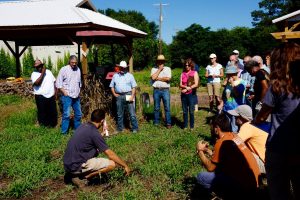
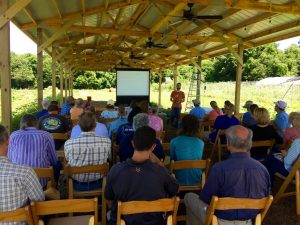
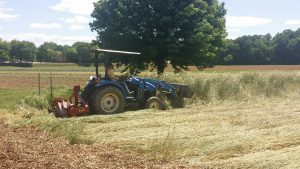
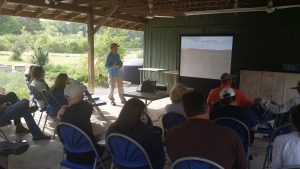
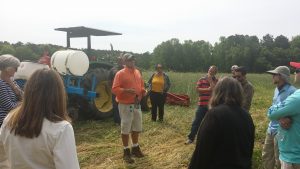
- 1 full day and 3 half day workshops were held in the subject area
- Cover Crops for Soil Health & Weed Controlin No-Till Vegetable Production - Wednesday, April 20th, 9AM – 12PM, Coastal Research and Education Center Experiment Station, Charleston, SC
- Weed Control for Sustainable Vegetable Production Using Cover Crops and No-till Practices - Wednesday, May 4th 2016, 9AM – 1PM, Clemson University Student Organic Farm, Clemson, SC
- Cover Crops for Soil Health & Weed Control in No-Till Vegetable Production - Wednesday, June 8th, 8:45am – 3:30pm, City Roots Farm, Columbia, SC
- Summer Cover Crops for No-Till Production of Late-Season Vegetables - September 30th 2016, 9AM – 1:30PM, Coastal Research and Education Center Experiment Station, Charleston, SC
- Participants gained practical information on the use of cover cropping for no till vegetable production. This method, which uses a cover crop mulch to suppress weed growth during the vegetable growing season, offers a more sustainable approach to weed management than the frequent use of herbicides and tillage. This is an especially valuable tool for organic farmers who do not use synthetic herbicides and therefore must rely on frequent cultivation and tillage for weed control. Participants in the training gained knowledge of the current research on cover cropping and no-till production, and also practical information on how to select, plant and manage cover crops for no-till vegetable production. Through direct observation they were familiarized with the most effective cover crop termination techniques including roll-crimping and flail mowing.
- Each participant received a copy of the Sustainable Agriculture, Research and Education Program’s publication "Managing Cover Crops Profitably".
To provide training on disease and insect management for sustainable vegetable production focusing on field monitoring techniques and preventative practices such as cultural methods, crop rotation, and selection of resistant vegetable varieties.
This one-day course focused on field diagnosis of key diseases and insect pests affecting cucurbit crops in organic production systems in South Carolina. Participants learned about techniques for sampling and identification of key diseases and their symptoms, and for insect pests and their natural enemies. Participants gained experience in the field monitoring disease and insect pests at the Clemson Organic Farm and practiced disease and insect identification using stereo microscopes and hand lenses in a lab setting. All participants received a hand lens to take home. There was ample time for questions and discussion about disease and insect problems and solutions.
Workshop Instructors
Dr. Anthony Keinath, Professor of Plant Pathology, Clemson University. Dr. Keinath serves as the vegetable pathologist for South Carolina. He has served as chair of the Publications Board for the American Phyopathological Society, and as Editor-in-Chief of Plant Disease, the leading international journal for applied plant pathology research. His research focuses on management, ecology, and epidemiology of fungal and bacterial pathogens of cucurbits and cole crops and general integrated pest management for vegetables. His area of expertise is the fungus Stagonosporopsis citrulli, the cause of gummy stem blight and black rot on cucurbits.
Dr. C. Powell Smith is a professor of Entomology and Extension Vegetable Specialist at Clemson University. Dr. Smith is based in Lexington County and serves as our state vegetable IPM specialist and is a regional lead Extension agent for vegetable and small fruit crops. He is an expert on sampling and identification of pest and beneficial insects, and his research and outreach programs have helped South Carolina vegetable growers reduce reliance on toxic insecticides in favor of more environmentally friendly pest management strategies.
Michael Mazourek is a Professor of Horticulture at Cornell University. Michael’s vegetable breeding program at Cornell is focused on developing new cultivars of pea, squash, melon, cucumber, bean and pepper crop for organic farming systems. This process of breeding new varieties through traditional methods of cross-pollination is informed by surveys of natural diversity and studies into the underlying genetic mechanisms. His grower-driven traits focus on fungal and insect resistances in regionally adapted backgrounds to provide a reliable, productive harvest and reduce the need for pesticide applications. His consumer-driven traits focus on color, quality, flavor and novelty to drive the consumption of naturally nutritious food.
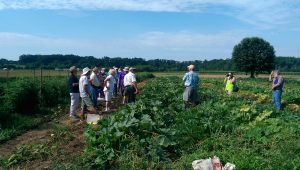
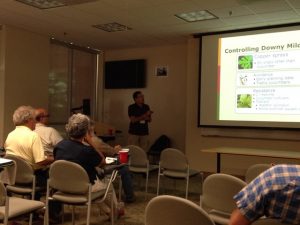
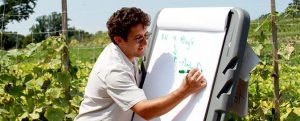
- 2 full day workshops were held in the subject area
- Insect & Disease Pest Management in Cucurbit Crops - July 11, Clemson, SC at Clemson University Organic Farm
- Integrated Pest Managment: Introduction, Special Topics and Application - December 1st 2016, Bluffton, SC at TEch. College of the Lowcountry and Three Sisters Farm
- Based on stakeholder input, this training provided more advanced information on techniques for sampling and identification of key diseases and their symptoms, and for insect pests and their natural enemies. Participants gained hands-on experience in the field monitoring disease and insect pests, and were able to practice and enhance skills with crop disease and insect identification using stereo microscopes and hand lenses in a lab setting. All participants received a hand lens to take home, and had an opportunity to receive expert answers and solutions to specific questions and problems regarding disease and insect management.
To provide hands on training in high tunnel construction, planning, and production appropriate for diversified vegetable production on small to mid-sized farms.
High Tunnels allow growers to extend the growing season and increase profitability. Those who were interested in learning more about building high tunnels and using them in crop production, joined us for a more in depth look at the opportunities high tunnels can provide.
In the afternoon on October 25th we toured working high tunnels at the Clemson Coastal Research and Education Center in Charleston, SC and observed over 20 varieties of plants currently in production there. Clemson Extension agent Zack Snipes led the tour and answered questions.
The following day October 26th we met at Middleton Place in Charleston, SC for a day-long training event. We spent the morning in a hands-on session constructing a high tunnel at the Middleton Place Organic Farm, including hoop-bending and construction of a 'caterpillar' high tunnel with all participants. After lunch prepared by Middleton Place (included) we convened in the classroom at Middleton Pavilion to learn from experts about how to build different types of high tunnels, high tunnel vegetable production and planning, and NRCS high tunnel cost-share programs.
In addition to support from Southern SARE, this training was supported by a number of different organizations including Lowcountry Local First, Carolina Farm Stewardship Association, the SC Natural Resource Conservation Service, Clemson Extension, and the Clemson University Sustainable Agriculture Program.
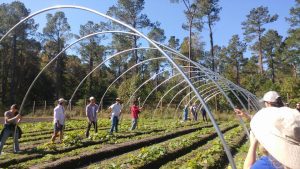
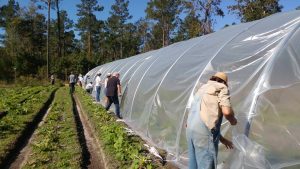
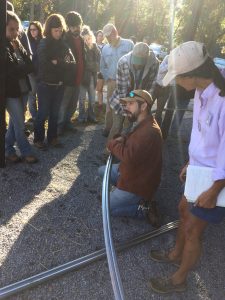
- A 1.5 day educational event was held in the subject area
- High Tunnel Construction and Use in Season Extension Production - October 25-26th at Coastal Research and Education Center and Middleton Place Organic Farm
- 1 site tour was held in the subject area
- Participants gained knowledge about the construction and use of high tunnels that will enable them to extend their growing seasons and increase profitability. They participated in actual building of a high tunnel on-site at the MIddleton Place farm, and they learned about crop planning for high tunnel production, about different types of high tunnels for different applications, and also about cost-share programs for on-farm high tunnel construction.
To collect input on preference for training in sustainable agriculture from our public stakeholders.
To review critical issues, challenges, and needs related to sustainable agriculture development in South Carolina.
To identify and prioritize sustainable agriculture training needs that can be addressed with available funding from SARE and other sources.
To develop a plan for educational/training programs to be organized in the following year to address the critical issues that are identified
Each SC SARE advisory member receives an invitation to an annual South Carolina Sustainable Agriculture Research and Education (SC SARE) Advisory Committee meeting. Traditionally, this meeting is held in early December.
The 2016 Advisory Committee meeting to prioritize training topics for the upcoming year was held on Friday December 2nd, 2016 from 1:30 till 4:30 pm at the Lake House at Sandhill REC at 900 Clemson Rd. in Columbia, SC immediately following the 2017 SC SARE Open Forum on Sustainable Agriculture.
Advisory Committee member input is very important in order to develop a plan for sustainable agriculture training in 2017. Each member is offered a one night’s stay at a nearby hotel (if needed) and local foods lunch during the meeting.
Participation at the Open Forum on Sustainable Agriculture in the morning prior to this meeting is encouraged in order to facilitate the Advisory Committee discussion in the afternoon.
The Open Forum on Sustianable Agriculture is an opportunity for public stakeholders to share their critical issues, challenges and needs related to Sustainable Agriculture development in South Carolina. The meeting is open to all South Carolina farmers, educators, policy makers, state and federal government and non-governmental agricultural agency personnel, and other South Carolina citizens with an interest in sustainable agriculture. Input from this public meeting was used by the SARE Advisory Committee to formulate plans for statewide sustainable agriculture training and education programs in 2017.
AGENDA
Morning - 2017 Open Forum on Sustainable Agriculture
8:45 - 9:30 Check in (Coffee and refreshments served)
9:30 - 9:40 Introduction and Welcome (Dr. Geoff Zehnder)
9:40 - 10:15 Group introductions (Individuals representing other organizations will have an opportunity to briefly discuss new or ongoing initiatives)
10:15 - 10:35 Review of 2016 programs and accomplishments (Geoff Zehnder, CU and Mark Nettles, SCSU)
10:35 - 11:35 Open discussion on issues relating to sustainable agriculture development in South Carolina. Where should we put program resources in 2017? (Facilitated session)
11:35 - 11:45 Break
11:45 - 12:30 Continue discussion to prioritize issues
12:30 - 1:30 Local Foods Lunch and adjourn Open Forum Meeting
Afternoon - 2016 SC SARE Advisory Committee Meeting
1:30 - 4:30 SC SARE Advisory Committee Meeting (AC Members)
4:30 – 5:00 Final Commentary & Adjourn AC meeting
- 1 half day Open Forum meeting was organized and held at a centralized location in the state where stakeholders came and provided valuable input for developing future training initiatives.
- 1 half day SARE Advisory Committee meeting was held to prioritize training activities for 2017
- Ag professionals and farmers from around the state were given an oppotunity to share information with the group about program activites which facilitated networking and collabaoration.
Educational & Outreach Activities
Participation Summary:
Learning Outcomes
Project Outcomes
Participant feedback is a valuable reference to gauge the quality of the training programs we provide in addition to their impact. Participants are surveyed between 1 and 6 months after a training event and, in addition to demographic information, are asked to provide feedback on how the training programs impacted their work in agriculture. Here is a sample of the feedback:
“Constantly reinforcing content helps me be a better instructor for our Growing New Farmers Program and assures I am linked to a network of leading scientists and practitioners in the field. Thank you!”
“We were already planning to use a cover crops and gained valuable information about how to go about it! Thanks!”
“I learned about when to terminate and what crops were best at different times of year were invaluable in decision making.”
“When giving workshops on this topic I'm always careful to share what I've learned through Clemson's experience & research, which is really valuable and awesome ;)”
“I was able to take the knowledge and educate economically disadvantaged people who were not able to attend the event. Friendly, knowledgeable staff, they were very willing to provide specific answers to individual on a one to one basis. Thank you.”
“After attending the workshop and reading Growing a Revolution, I am trialing a quarter acre test plot of wheat just using cover crops.”
“I have designed processing area with information that I learned in the class. I use charts from the training to educate my staff on appropriate cooling techniques and temperatures. I also learned more about grading produce and wholesale markets.”
“We were able to implement cold storage practices to further our shelf life. We also incorporated practices that have helped with GAP”
“the book has been very helpful.”
Face of SARE
The South Carolina Sustainable Agriculture Research and Education (SARE) Program is conducted as a partnership between Clemson University and South Carolina State University with support from Southern Region SARE. The program is managed by stakeholder input through an advisory committee consisting of farmers, agriculture professionals, non-government representatives and others with an interest in sustainable agriculture development. Our mission/strategic plan is to provide sustainable agriculture education and outreach programs to Cooperative Extension Service personnel, Natural Resources Conservation Service staff and other agriculture professionals, farmers, and landowners with an interest in sustainable agriculture.
To the extent possible we will emphasize an interdisciplinary and participatory approach to training. For example, the training on pest management utilizes an experiential approach where participants perform pest sampling and identification, will observe pest management operations in the field and will participate in pest control decision-making exercises. Training will focus on an experiential approach to learning where classroom sessions are supplemented with hands-on training in the field. Primary audiences for the training are 1862 and 1890 Extension agents, NRCS conservation field staff, and other agriculture professionals. Agriculture professionals who serve small-scale, minority and limited resource farmers as well as those serving larger-scale conventional farms will be encouraged to attend. Strong stakeholder participation and input into educational program development will reinforce trainee participation and enthusiasm for the program.
The Sustainable Agriculture Program website highlights the SA Program and provides information on training events through a calendar of activities and descriptions of successful projects. In addition, the MSP Assistant maintains a state calendar of sustainable agriculture training events that is accessible to all stakeholder organizations who conduct sustainable agriculture training. The calendar is used to coordinate training dates and to facilitate collaboration and leveraging of resources to organize joint training in areas of shared interest. The program website is currently being updated with a resource section with online training materials and links to additional resources on sustainable agriculture. The program website will also provide updated information including contact information for Advisory Committee members, a current calendar of activities that is linked to stakeholder organization event calendars, a listing of subject matter experts who may be contacted for information (including extension agents), and links to other resources and funding opportunities. While the program website serves as a valuable tool for disseminating information, email announcements to a listing of over 2,000 stakeholders is our primary means of communication.
We also provide consultation to agriculture professionals and farmers interested in developing SARE grant proposals, and we promote the availability of SAN resource materials regularly via announcements to our email list. A link to the SAN website and funded grant program database is provided on the program website. Notices of new SAN publications are disseminated to agents via email, and a pool of funds will be set aside to purchase cost publications for agents based on programmatic and financial need. Incoming Extension agents will be encouraged to complete the Southern and National Core Sustainable Agriculture curricula. Announcement of the annual call for SARE/NACAA Sustainable Agriculture Fellows program applications will be forwarded via email to Clemson and SCSU Extension agents and we will provide assistance with application development to agents interested in applying. Efforts are also made to invite Southern Region SARE personnel to South Carolina to discuss grant opportunities and other relevant SARE programs. For example, Dr. Lee Meyer made a visit to Clemson in 2016 and spoke to faculty, students and staff about SARE programs.